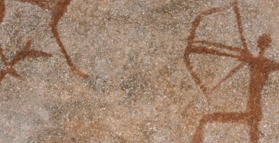 Is a hunter-gather diet and lifestyle healthy?
Is a hunter-gather diet and lifestyle healthy?
Posted on Mon, 7 Jan 19

A review of the diet and lifestyle of hunter-gatherers as a model for health promotion advances our knowledge and busts popular ‘paleo diet’ myths.
For some time, scientists have been using fossil and ethnographic records to find reasons why departure from hunter-gatherer life-ways may help explain the rise of modern ‘diseases of civilization’ such as heart disease, diabetes, obesity, and cancer.
In addition to considerable research, evolutionary medicine has captivated the public, most notably in popular diet books where the ‘paleodiet’ concept is used to justify low-carbohydrate diets.
But our understanding of hunter-gather life-ways has important limitations, and popular notions may be “romanticized caricatures of some lost Eden,” point out the authors of a new review and update on hunter-gatherer health and lifestyles.
Focusing on the topics of health, physical activity, energy expenditure and diet, the research team summarise recent discoveries and supplement them with some of their own work studying Hadza hunter-gatherers in northern Tanzania.
Here are the key findings:
- Longevity among small-scale hunter-gatherer or subsistence farming populations approaches that of industrialized populations, and metabolic and cardiovascular disease are rare.
- Obesity prevalence is very low (<5%), and mean body fat percentage is modest (women: 24- 28%, men: 9-18%).
- Activity levels are high, exceeding 100 min per day of moderate and vigorous physical activity, but daily energy expenditures are similar to industrialized populations.
- Diets in hunter-gatherer and other small-scale societies tend to be less energy dense and richer in fibre and micronutrients than modern diets but are not invariably low carbohydrate as sometimes argued.
Regarding diet, the authors note that while early studies of hunter-gather diets suggested a relatively high proportion of energy from animal-source foods, more recent data including their own analysis of the Hadza suggest that many groups were consuming diets relatively rich in carbohydrates and simple sugar from honey. Further, new discoveries have revealed that Palaeolithic humans were eating cooked, processed grains from wild grasses. So much for low-carb, grain-free popular "paleo diets."
The authors also note that there are several factors, beyond diet and exercise – including close friendships and family bonds, low levels of social and economic inequality and lots of time spent outdoors – that would also influence health.
“As we work to understand the evolutionary roots of modern disease, we should strive for a more integrative and holistic understanding of lifestyle and health among hunter-gatherers today and in our collective past,” they concluded.
Reference:
Pontzer H, Wood BM, Raichlen DA. Hunter-gatherers as models in public health. Obes Rev. 2018 Dec;19 Suppl 1:24-35.
Tags: Paleo Diet, Paleolithic, Paleo




